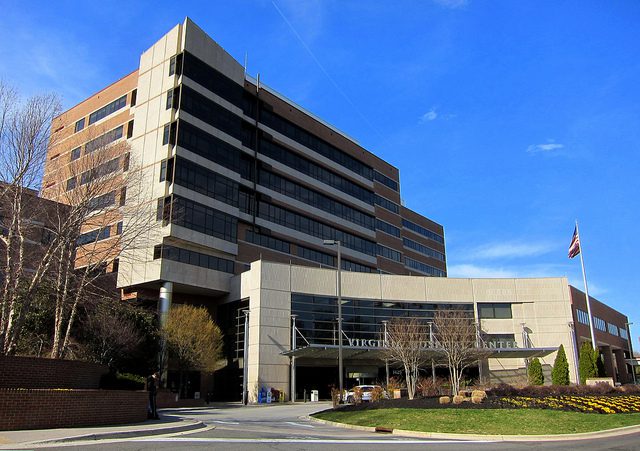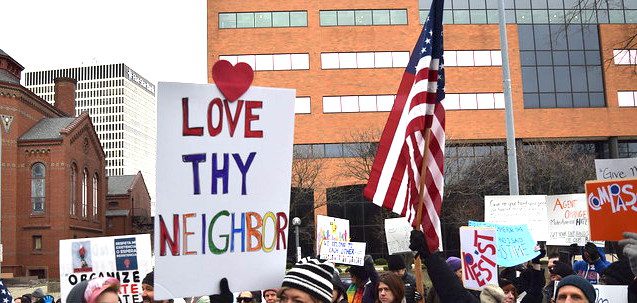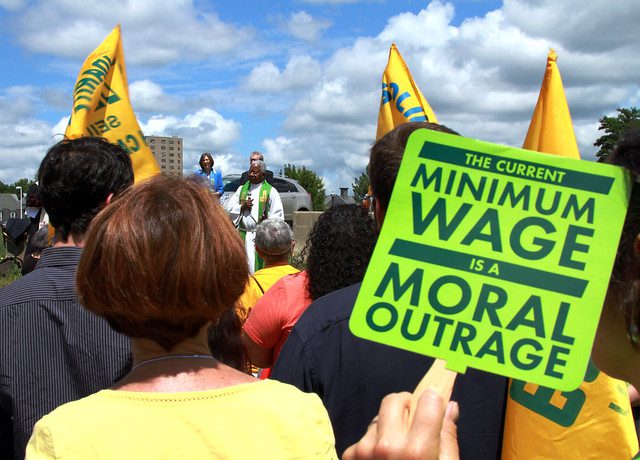
Virginia Hospital Center. Photo by Josh via flickr, CC BY-ND 2.0
Big news on the health front: There’s a possibility that hospitals will be allowed to pay for housing, and even healthy food, through Medicaid. “We believe we could spend less money on health care—and, most important, help Americans live healthier lives—if we did a better job of aligning federal health investments with our investments in non-health care needs,” said Alex Azar, the secretary of the U.S. department of Health and Human Services. Wow; this could be huge.
We were shocked to learn the details of the nation’s maternal mortality rates in ProPublica’s frightening report last year—the U.S.’ rates are three times higher than other “developed” countries, and low-income mothers and Black mothers suffer even higher rates. The story sparked a wave of people coming forward with personal stories of hospital and staff negligence, along with calls for incorporating doulas, trained birth coaches who assist and advocate for women in pre- and post-natal care. Now, New York State has launched a pilot program that will expand Medicaid coverage to doula services, reaching a key low-income population of women. Two states, Oregon and Minnesota, have had partial Medicaid reimbursement for doula services for several years now.
Many small-business owners struggle to eke out a living, and some ultimately turn to loans to pay bills and keep themselves afloat. Using an old law called “confessions of judgment”—which were banned for consumer loans in the 80s but still in use for business loans in New York state—companies that desperate business owners turn to for very high interest loans have sidestepped what can be a lengthy and expensive collection process upon default. When borrowers sign for their loan (oftentimes with as much as a 400 percent interest rate), they also sign a waiver that gives the company permission to immediately begin seizing assets if they miss one payment. The staggering amount of money that has been seized via this loophole is unbelievable, and how one of this industry’s largest lenders got its start is enraging.
Sweat equity for down payment costs: Freddie Mac is expanding a program that allowed certain borrowers to use their construction skills instead of cash to cover a portion of the down payment and closing costs associated with buying a home. Now these borrowers can cover the entire down payment via sweat equity. “In rural America, many creditworthy families with low-to-moderate incomes face significant barriers to homeownership, especially obtaining the down payment,” says Mike Dawson of Freddie Mac. “This offering will help them use their own construction skills to make up that difference, increasing the pool of mortgage-ready consumers.” It’s a smart move.
About that Amazon deal . . . The New York site selected to be the home of Amazon’s new headquarters was expected to house a development that would have included 1,500 units of affordable housing. Now those plans are pretty much off the table. A portion of the site is owned by Plaxell, a plastics company, which proposed a 15-acre rezoning of the area that would include—among other things—a 5,000-unit development, 25 percent of which would have been dedicated to low- and moderate-income housing. The company is expected to get a fairly hefty sum from Amazon. The more we hear about this Amazon deal, the more we dislike it.
Were we the only ones taken by surprise by Arnold Schwarzenegger’s “war” on gerrymandering? Apparently the former California governor became obsessed with redistricting reform in 2008 after successfully pushing for a ballot initiative that gave a nonpartisan commission, instead of politicians, the authority to draw legislative districts. Schwarzenegger backed successful ballot initiatives to bring independent redistricting commissions to several states this past election, including in Michigan, Missouri, and Colorado. He seems to be one of a few principled republicans out there. Bravo.
The Struggle to Pay for Housing Heads to Congress. Alexandria Ocasio-Cortez, the newly elected member of Congress from New York City, is taking D.C. by storm with her commitment to push positive action on issues from getting more progressive caucus power on committees to climate change and jobs. While she hasn’t proposed a specific affordable housing plan in the past couple of weeks, she’s nonetheless brought a lot of attention to the issue just by admitting to The New York Times that until she starts drawing her congressional salary she’ll have difficulty affording an apartment in D.C. Many, many people related to her challenge, though it has drawn some backlash, in mockery from the right or people wanting to advise her on personal finance. Never one to mince words, she responded to the kerfuffle by saying on Twitter: “The actual fear driving the attacks on my clothes, my checking account, my rent, isn’t that these folks are scared that I shouldn’t represent people in Congress. It’s fear that they’ve allowed their riches, their privilege, + their bias to put them to a point where they can’t.”
California’s fires likely to increase health disparities. As with most disasters, the burden of the California wildfires crisis is going to fall more heavily on those who are already disadvantaged, especially in a world where distrust of government has led to underfunding and weakening of the public sector. While rich celebrities can pay private firefighters to protect their homes (and presumably go elsewhere until the air clears), people in the surrounding areas are struggling with smoke exposure. The health effects of the toxic air are falling most heavily on those who don’t have the choice to stay inside places with good air filtration—including those who work outside, can’t work from home, don’t travel by car, live in substandard housing, or are homeless. The city of San Francisco is taking criticism for not distributing sufficient numbers of masks to its population of thousands of homeless people. Democratic Socialists of America, as of Wednesday, Nov. 21, say they’ve distributed 5,000 masks to the city’s homeless, and are still getting calls from nonprofits asking if they have more.
Los Angeles’s General Hospital, which has historical ties to the Chicano Rights Movement and AIDS activism, may be repurposed as affordable housing. Since the building is located in the middle of a medical campus, this could also provide a benefit to residents in terms of easy health care access.





Comments